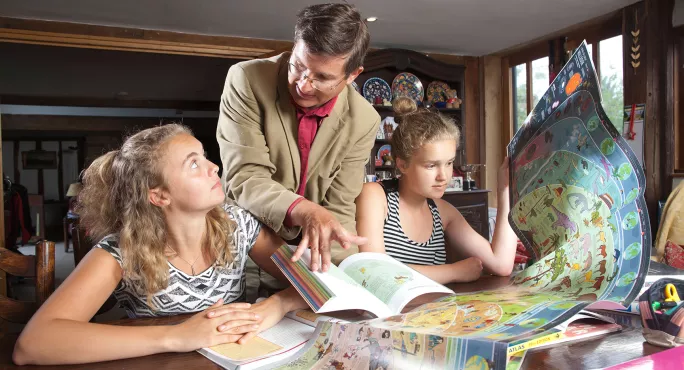- Home
- Does Mongolian throat singing count as homeschooling?
Does Mongolian throat singing count as homeschooling?

When the government first announced that schools would close to most pupils, parents quaked at the implications.
The prospect of looking after our primary-age children at the same time as doing our jobs and dealing with our own crises seemed like a step too far for many.
Out of necessity, many parents were left planning an extensive Netflix and CBeebies schedule for their offspring just to get through the day. If their children could fill in a (now pointless) Sats practice paper in between episodes of Teen Titans, all the better.
Lots of teachers with families are in this very situation themselves - dishing out worksheets and online learning ideas to their classes while drip feeding their own children Haribo and Captain Underpants.
However, as I’ve got to grips with all this myself, I have noticed that there are parents who have not-so-secretly relished the opportunity to temporarily “homeschool” their kids.
The school closures offered, in some north-east London households at least, the chance for parents to shake off the shackles of Sats and accountability and open up the curriculum beyond its stuffy Govian and Gibbian boundaries.
In such households, Spag was very much out, while Mongolian throat singing and Louis IV were very much in. Degree subjects were dusted off and old hobbies and obscure passions resurrected.
This first became obvious on the last day before the closure when a (now out-of-work) supply teacher said he “couldn’t wait” to get his kids home and teach them “the history of alternative comedy”. I don’t think he was joking.
Another parent said he planned to teach his Year 4 son about the Russian Revolution…Tough luck if he thought he was going to play Fortnite for six weeks.
I heard from parents using the time to teach their children more about their heritage, dancing around the kitchen to soca music and cooking Caribbean recipes.
One parent was teaching her eight-year-old son all about fairies while another has been foraging for wild garlic to make garlic bread. Another took her daughters to watch nesting swans and marvelled at light refracted through a magnifying glass.
My own kids researched all there is to know about hedgehogs after we found the remains of one on the local playing fields, sliced up by the groundskeeper’s lawnmower. It was a gruesome scene but I was able to convey my personal passion for the spiny mammals with this unique lesson starter.
Other parents went crazy for crafts - suddenly the curriculum was filled with distinctly underassessed skills such as crochet, tie-dye and baking.
Of course, many roped their children into their own projects and household chores. One mum told me she couldn’t believe she had never found time to teach her 11-year-old to use the washing machine before. Another said her son had been insulating the shed with tin foil after failing to engage with his state-sanctioned school work.
Many children will be returning to school with a whole new set of life skills, even if their social skills have taken a hit through not meeting anyone for six weeks.
However, as the Easter holiday arrived, I think even the most enthusiastic of temporary home educators agreed that it had been an exhausting experience so far. Never before had the end of term looked so appealing.
The parent WhatsApp group went quiet as our energy was sapped and an afternoon of random YouTube videos began to seem like a reasonable learning option.
The constant pressure to come up with ideas and tasks that last longer than five minutes is draining no matter how passionate I am about the subject. Adjusting activities so that they are appropriate to each individual child takes up too much brain space - and I only have three children, not 30.
And then there is the nagging doubt: are they actually learning anything, or am I just keeping them occupied?
While I’m partly glad that my children are having a holiday from formal learning, the experience has given me a whole new appreciation of what teachers do day in, day out.
The relentlessness of it is awe inspiring.
No one really cares what I teach my kids except me, and I can - should I so wish - lurch incoherently from Kubla Khan to Cubism by way of the suffragettes and ravioli in one feverish afternoon.
Real teachers are expected to inspire children to learn under a strict curriculum and accountability framework that does its best to stifle personal passions and off-piste exploration.
So hats off to all the teachers and teaching assistants who do successfully manage to convey their passions and interests and fire up kids about a world of wonders beyond government strictures.
May you continue to do so by your learning platform video posts, your great art ideas, writing challenges and links to cool resources that I would never have found.
Parents now have a fresh perspective on the relentless work teachers do for our children every single day and we salute you.
Irena Barker is a freelance journalist
Keep reading for just £1 per month
You've reached your limit of free articles this month. Subscribe for £1 per month for three months and get:
- Unlimited access to all Tes magazine content
- Exclusive subscriber-only stories
- Award-winning email newsletters



